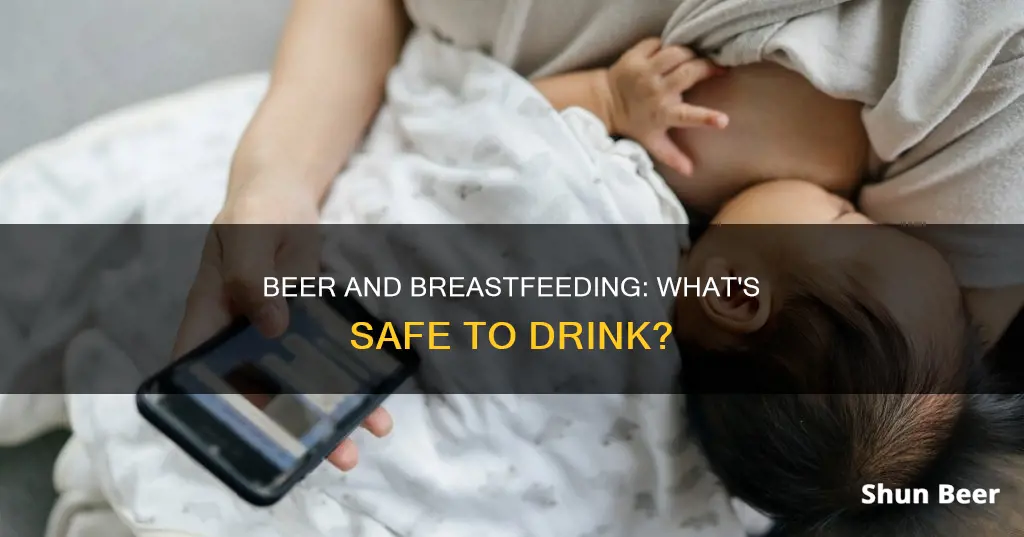
There are many opinions on whether it is safe to drink beer while breastfeeding. While some sources say that it is best to avoid alcohol altogether, others say that an occasional drink is okay. The key is to drink in moderation and to wait until the alcohol has left your breast milk before nursing your baby. The amount of time this takes depends on various factors, including how much you drink, how fast you drink, whether you consume food with your drink, your body weight, and individual variations in alcohol absorption and metabolism.
| Characteristics | Values |
|---|---|
| Alcohol in breast milk | Yes |
| Alcohol in breast milk after drinking | 30-60 minutes |
| Alcohol in breast milk after eating and drinking | 30-90 minutes |
| Alcohol in breast milk after drinking one beer | 2 hours |
| Alcohol in breast milk after drinking two beers | 4-5 hours |
| Alcohol in breast milk after drinking three beers | 6-8 hours |
| Alcohol in breast milk after drinking four beers | 8-10 hours |
| Effects of alcohol on baby | Sleep disturbances, impaired REM sleep, decreased milk intake, impaired immune function, delay of motor development, potential impairment of cognitive development, reduction in ability for abstract reasoning at school age |
| Effects of alcohol on breastfeeding mother | Delayed milk ejection reflex, decreased milk production |
| Occasional drinking while breastfeeding | No adverse effects on babies |
What You'll Learn

How much alcohol can be consumed while breastfeeding?
The amount of alcohol that can be consumed while breastfeeding is a highly debated topic, with conflicting advice being given by healthcare professionals. While some recommend abstinence, others state that alcohol consumption while breastfeeding carries little risk. However, it is important to note that there is limited data and research on the effects of alcohol consumption on breastfeeding women and their infants.
Recommendations for Alcohol Consumption while Breastfeeding:
- The American Academy of Pediatrics (AAP) recommends that alcohol ingestion be minimized and limited to no more than 0.5 g of alcohol per kg of body weight. For a 60 kg mother, this translates to approximately 2 oz of liquor, 8 oz of wine, or 2 beers.
- The AAP also suggests waiting at least 2 hours after drinking before nursing to minimize the concentration of alcohol in the ingested milk.
- The Motherisk program in Toronto, Canada, has issued more conservative recommendations, stating that there are currently no known benefits of exposing nursing infants to alcohol. They advise that it is prudent for mothers to delay breastfeeding until alcohol is completely cleared from their breast milk.
- Several sources recommend limiting alcohol intake to one drink per day, which is defined as 12 oz of regular beer, 5 oz of wine, or 1.5 oz of distilled spirits.
- It is important to note that the more alcohol is consumed, the longer it takes to clear the body. For example, alcohol from 1 drink can be detected in breast milk for about 2-3 hours, while alcohol from 3 drinks can be detected for about 6-8 hours.
- Newborns have immature livers and are more affected by alcohol. It is recommended to avoid drinking alcohol until the baby is at least 8 weeks old.
- Alcohol consumption has been shown to inhibit let-down and decrease milk production. One study showed a 23% decrease in milk volume with just one drink.
- Daily alcohol consumption has been associated with an increased risk for slow weight gain and delayed gross motor development in infants.
- Alcohol consumption can also impact the sleep patterns of infants, with studies showing decreased sleep duration and more frequent wakefulness.
- It is important to never share a bed or sleeping surface with your baby if you have been drinking, as it increases the risk of sudden infant death syndrome (SIDS).
- If you have drunk a significant amount of alcohol, it is recommended to express your milk for comfort and to maintain your supply, but this milk should not be fed to the baby.
In conclusion, while occasional alcohol consumption (1-2 drinks) does not appear to be harmful to the nursing baby, many experts recommend limiting alcohol intake to no more than 1-2 drinks per week while breastfeeding. It is important to prioritize the health and safety of the baby and to always consult with a healthcare professional for personalized advice.
Warm Beer: Does Temperature Affect Alcohol Absorption?
You may want to see also

How long after drinking alcohol is it safe to breastfeed?
It is important to note that the guidelines for drinking alcohol while breastfeeding are not as clear-cut as they are for pregnancy, where no amount of alcohol is considered safe. However, here is a detailed overview of the recommendations and associated risks regarding alcohol consumption and breastfeeding.
It is generally recommended to wait at least 2 hours after drinking alcohol before breastfeeding. This allows time for the alcohol to leave your breast milk. The more alcohol you consume, the longer it will take for it to clear from your system and your breast milk. For example, alcohol from 1 drink can typically be detected in breast milk for about 2 to 3 hours, while alcohol from 2 drinks can be detected for about 4 to 5 hours, and so on.
It is worth noting that the time it takes for alcohol to clear from breast milk can vary depending on several factors, including how fast the alcohol is consumed, whether it is consumed with food, the mother's body weight, and individual variations in alcohol absorption and metabolism.
While an occasional drink is unlikely to harm your baby, regular drinking above the recommended limits can be harmful to both you and your baby. Excessive alcohol consumption can decrease your milk supply, cause sleep problems, and impact your baby's growth and development. Additionally, drinking alcohol can impair your ability to safely care for your baby, and it is strongly advised not to share a bed or sofa with your baby if you have been drinking.
If you choose to avoid alcohol while breastfeeding, there are alternative ways to relax and enjoy social occasions. You can try mocktails, non-alcoholic drinks, herbal teas, or other relaxing activities like a hot bath, massage, or yoga.
The American Academy of Pediatrics recommends that alcohol intake by a breastfeeding mother should be occasional and moderate. The CDC states that "not drinking alcohol is the safest option for breastfeeding mothers," but also notes that moderate alcohol consumption (up to 1 drink per day) is not known to be harmful to the infant.
The Motherisk program in Toronto, Canada, takes a more conservative approach, stating that "until a safe level of alcohol in breast milk is established, no alcohol in breast milk is safest for nursing babies." They recommend that mothers delay breastfeeding until alcohol is completely cleared from their breast milk.
If you plan to drink alcohol, it is advisable to breastfeed your baby before consuming any alcoholic beverages. If you need to nurse your baby before the alcohol has cleared from your system, you can use previously expressed milk or formula. It is also important to be aware of the amount you drink, as the more alcohol you consume, the longer it will take to clear from your system.
In summary, while there is no definitive answer to the question of how long after drinking alcohol it is safe to breastfeed, the general recommendation is to wait at least 2 hours. This timeframe can vary depending on various factors and the amount of alcohol consumed. It is essential to weigh the benefits of breastfeeding against the potential risks of alcohol consumption and always prioritize the safety and well-being of your baby.
Beer and Anemia: Is It Safe to Drink?
You may want to see also

Does alcohol affect breast milk production?
While there is limited data on the consequences of alcohol intake for breastfeeding women and their infants, it is important to provide accurate information on the effects of alcohol consumption.
The effect of alcohol on milk production
There is a long-standing belief that consuming alcohol, particularly beer, while breastfeeding can help boost milk production. While the barley in beer does contain a polysaccharide that increases prolactin production, which stimulates milk production, alcohol on its own decreases milk production. Alcohol inhibits the release of oxytocin, which stimulates milk ejection. The higher the alcohol intake, the greater the effect on inhibiting milk ejection. Research has shown that infants consumed approximately 20-23% less milk in the first 3-4 hours after maternal alcohol consumption.
Short-term effects on a nursing infant
Studies have shown that infants breastfed by women who had consumed alcohol prior to nursing consumed approximately 20% less milk in the first 4 hours after maternal alcohol consumption than women who did not drink. However, a subsequent study reported that, if mothers did not consume any more alcohol, babies breastfed more frequently and consumed larger amounts of milk in the 8 to 12 hours after maternal alcohol consumption. Changes in infants’ sleep patterns have also been observed. While 2 studies reported that the total amount of sleep was unchanged after consuming alcohol-containing milk, these studies noted that the sleep was more fragmented. In contrast, another study demonstrated that total duration of sleep decreased on average by about 25% after infants consumed alcohol-containing milk.
Long-term effects on a nursing infant
There is limited research on the long-term effects of alcohol consumption on nursing infants. A study of 400 infants investigated infant development at age 1 year in relation to maternal alcohol use while breastfeeding. Indices of motor development were significantly lower in infants exposed regularly to alcohol in breast milk. The researchers observed an inverse dose-response relationship between the frequency of maternal alcohol consumption and scores on the Psychomotor Development Index (PDI). Infants of breastfeeding mothers who had 1 or more drinks daily had a mean PDI score of 98, compared to a mean score of 103 in infants exposed to less alcohol in breast milk. This association persisted after controlling for more than 100 potential confounding variables, including smoking and use of other drugs.
Guidelines for alcohol consumption while breastfeeding
Guidelines regarding alcohol use while breastfeeding vary. The American Academy of Pediatrics (AAP) recommends that alcohol ingestion be limited to an occasional intake but no more than 0.5 g of alcohol per kg of body weight, which for a 60 kg mother is approximately 2 oz of liquor, 8 oz of wine, or 2 beers. The Motherisk program in Toronto, Canada, has issued more conservative recommendations, stating that there are no known benefits of exposing nursing infants to alcohol and that no alcohol in breast milk is safest for nursing babies.
Afib and Alcohol: Is Drinking Beer Safe?
You may want to see also

What are the short-term effects of alcohol on a nursing infant?
The short-term effects of alcohol on a nursing infant depend on the amount of alcohol consumed by the breastfeeding parent and when the baby is fed after alcohol consumption.
Studies have shown that infants breastfed by women who had consumed alcohol prior to nursing consumed approximately 20% less milk in the first 4 hours after maternal alcohol consumption than infants of women who did not drink. However, a subsequent study reported that, if mothers did not consume any more alcohol, babies breastfed more frequently and consumed larger amounts of milk in the 8 to 12 hours after maternal alcohol consumption.
Although some have speculated that this reduction in infant milk consumption may be caused by changes in the taste of the milk, it is probably more related to decreased supply. In fact, one study observed that infants actually consumed larger amounts of alcohol-enriched milk than plain breast milk when provided to them in a bottle.
Changes in infants’ sleep patterns have also been observed. While 2 studies reported that the total amount of sleep was unchanged after consuming alcohol-containing milk, these studies noted that the sleep was more fragmented. In contrast, another study demonstrated that the total duration of sleep decreased on average by about 25% after infants consumed alcohol-containing milk.
According to the CDC, nursing after 1 or 2 drinks (including beer) can decrease the infant’s milk intake by 20 to 23% and cause infant agitation and poor sleep patterns. Nursing or pumping within 1 hour before ingesting alcohol may slightly reduce the subsequent amounts of alcohol in breast milk.
Infants exposed to a significant amount of alcohol (0.3 g/kg of the parent’s body weight) through drinking human milk spend significantly less time in both active and total sleep. REM sleep is also disrupted. As infants are less able to process alcohol than adults due to their immature systems, researchers believe that the dosage they receive through their mother’s/lactating parent’s milk may be stronger than it would be in an adult.
Drinking Beer on a Pier: What's the Legal Ruling?
You may want to see also

What are the long-term effects of alcohol on a nursing infant?
The long-term effects of alcohol on a nursing infant are not yet fully understood. However, there is some evidence to suggest that regular exposure to alcohol in breast milk may have adverse effects on the infant's development.
One study found that infants exposed regularly to alcohol in breast milk had significantly lower scores on indices of motor development, with an inverse dose-response relationship between the frequency of maternal alcohol consumption and scores. These effects were more pronounced when mothers who supplemented breastfeeding with formula were excluded from the analysis.
Another study found that heavier maternal alcohol consumption was associated with dose-dependent reductions in abstract reasoning in children at ages 6 to 7 years who had been breastfed. This association was not observed in infants who had never been breastfed, suggesting that exposure to alcohol via breast milk was responsible for the reductions in cognitive functioning.
In addition, animal studies indicate that alcohol may be toxic to the developing brain, especially during periods of rapid brain development such as in the first year after birth. Impairments to memory and inhibitory responses may also occur as a result of an infant's consumption of alcohol.
While the research is limited, the current evidence suggests that regular and/or heavy alcohol consumption by breastfeeding mothers may have long-term effects on their infants' motor development and cognitive functioning. However, more research is needed to fully understand the long-term effects of alcohol exposure via breast milk.
Running After Drinking Beer: Is It Safe?
You may want to see also
Frequently asked questions
According to the Centers for Disease Control and Prevention (CDC), the safest option is to abstain from alcohol while breastfeeding. However, occasional light drinking is generally considered safe and is not known to have adverse effects on babies.
It is recommended to wait for at least 2 hours after drinking one standard drink before breastfeeding. For two drinks, wait for 4 to 5 hours. The more you drink, the longer you should wait.
Yes, alcohol can affect the hormones that control breast milk production and reduce your supply. It can also inhibit the milk ejection reflex, resulting in the baby getting less milk.
Drinking beer or alcohol may cause your baby to experience increased awake times, irritability, and changes in sleep patterns. It can also alter the taste and smell of your breast milk, which may affect your baby's feeding.
The long-term effects of drinking beer while breastfeeding are not well understood and require further research. However, regular or heavy drinking while breastfeeding is not advised, as it may affect your baby's growth and development.







